
13 minute read
Lauren McAllister & Simon Bank - Business Minds
focus_contributor.
BUSINESS MINDS
tLAUREN MCALLISTER AND SIMON BANK
FROM WEBSTUDIO
This month there has been a strong push in our region on bouncing back and recovering from lockdown, yet again. We have been working with Clint from My Video Producer, as well as Jane Hillsdon, founder of the How To Do Marketing Academy, on a live streaming series designed to help small businesses get back on track. Clint and Jane have gathered a group of creative marketing professionals from across our region to share their advice and strategies.
Our contribution to this initiative is all about helping you get the most out of your website.
What are the key elements you need to create the best website for your business?
We all know fi rst impressions are crucial. Your website is an essential element of your business’s marketing strategy. It needs to quickly and effectively convey who you are and what you do. Here are seven elements to focus on, when planning and building your business website:
User friendly design. First and foremost, think about the information customers are looking to get from your website and ensure it is easy to fi nd. Think of the general path you would like a site visitor to take and lead them there, with links to key pages and helpful articles. Navigation should be intuitive for users. This includes limiting your top-level menu to six or seven clearly labelled tabs, with related pages organised under them. We suggest splitting long blocks of content on each page into smaller sections, mixed with photos and videos that help get your message across.
Mobile friendly. A mobile-friendly website keeps your website visitors engaged for longer, increasing the likelihood they will do business with you. This requires some careful planning during the design phase to ensure a seamless experience on mobile devices.
Clean, fresh style. You want styling that is consistent with your branding, using authentic imagery and video to give visitors an enjoyable and informative experience. We recommend showing photos and videos that show off your business, whether that be services or products, rather than simply using stock photos.
Compelling, unique content. Your content should be based around your key messaging and Unique Value Proposition, setting you apart from your competitors. It should also be interesting and engaging content that is easy to read, yet informative. Research shows users skim read web pages – so you should use clear headings and bullet points to make your content easy to fl ick through while keeping sentences and paragraphs short.
Easy to fi nd. To ensure your website is found on search engines, your content needs to include strategic keywords, in order to rank well for important search terms. For some businesses, it may be worth spending money on paid search ads – however, it is often more costeffective in the long run to focus on improving your “organic” search engine ranking.
Calls to action. Make it crystal clear what you offer, why your product or service is superior, and make it easy for website visitors to take the next step. For example, “call us today for a free in-home consultation”.
Regularly updated. An effective website is not “set and forget”. As your business evolves and changes, your website should refl ect this. You should aim to publish new content regularly in the form of a blog, as this is a great way to engage current customers and reach new ones. From time to time, a full website renovation is also a great idea.
And remember, your website is not the only point of contact by which a potential customer will experience your business. Your branding and messaging needs to be strong and consistent across all platforms.







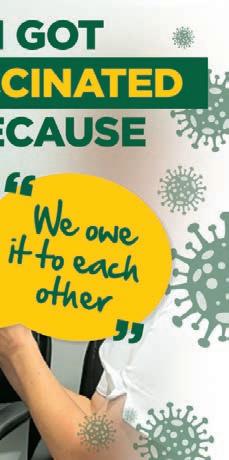
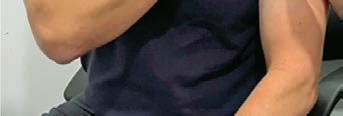






focus_interview
for WORDS
Brand new SBS documentary ‘Lost for Words’ follows eight brave Australians taking on a life-changing opportunity to transform Australians taking on their lives in an intensive nine-week adult literacy program. Hosted and narrated by literacy advocate Jay Laga’aia, this is an empowering and upli ing observational series that confronts an empowering and upli ing observational series that confronts Australia’s staggeringly low adult literacy rate.
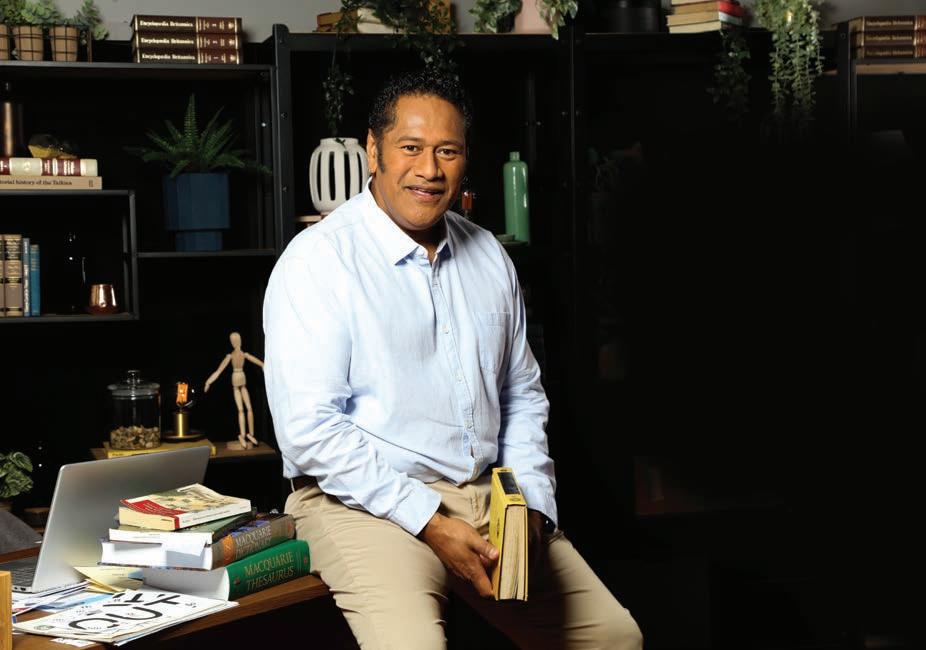
Thank you for speaking with
me today, Shelle, and for sharing your story with us! Can you please tell us a bit about yourself and how you came to be involved in the adult literacy program?
Sure. My name’s Michelle, I was diagnosed with dyslexia when I was four years old, and spent my whole life struggling with dyslexia. My parents put me through multiple tutoring programs to see if the classes would help me get through my school life. Then in my adult life the support kind of petered out. You fi nd new hurdles to overcome. When I was younger, I just thought it would impact my ability to do schoolwork or perform an exam. In the adult world it impacts me reading bills, phone plans, reading recipes so I’ve always been on the lookout to fi nd help.
Last year I was watching ‘Eight out of 10 Cats does Countdown’ and saw an ad for SBS literacy. It wasn't so much me wanting to apply to go onto the TV show itself, I actually requested they put me in contact with some resources for adult literacy. I just wanted some help and then they got back to me very, very quickly and asked if I’d like to be on the show. The producers were so lovely, they said the show would be worth my while and it defi nitely was.
I had a wonderful time, have a lot of new strategies, and meeting other people with dyslexia and learning diffi culties has been really helpful.
Meeting people who had similar diffi culties and similar achievements to me was really heartwarming and it just made me feel like I wasn’t alone so that really, really helped out.
I was very surprised to fi nd out so many adults have diffi culty with reading and writing skills!
When we were in school we all experienced some ridicule for being dyslexic, being called slow, lazy or stupid –so as adults, we find ways to hide that we’re having trouble. I probably don’t even spot people with learning disabilities because they’re very good at hiding it.
Congratulations on advancing from level three to level four in your literacy skills and for graduating from the course, it’s an amazing achievement! How has your life changed since then?
I feel a lot more confident now since being on the course. I left my Wollongong job and I’ve been successful applying for and getting a job here in Port Macquarie. Before the show, I stayed with my old job because I loved it and when I ran into it as a 21 year old, they knew
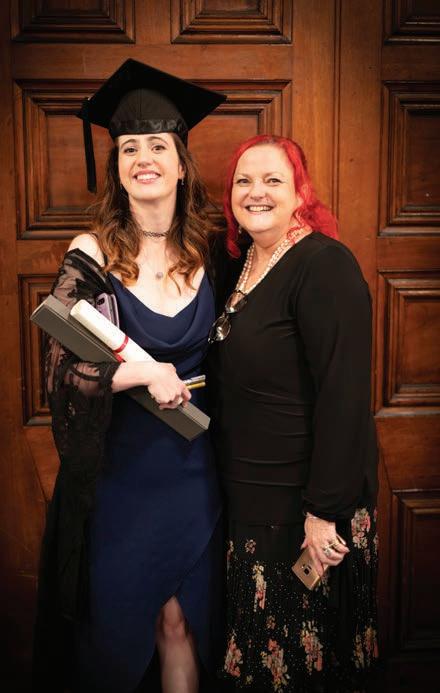

I was dyslexic and were very accommodating. There was a very real fear that if I left, would I have the same understanding and acceptance of my dyslexic moments (as much as I hate to call them that), or will I just be going back to being called lazy or stupid. So being on the show helped me build the confidence to say if they have problems with my dyslexia, that’s on them, not on me.
I’ve still got a fair way to go but I've got a much more solid basis to start from instead of my little strategies that I had created for a school environment. It has been a great help to me.
It must have been a great experience working with renowned indigenous chef Mark Olive. Have you been cooking more and do you have any favourite recipes to follow?
It was a wonderful experience cooking with him, he was very encouraging and very kind. I find cooking and reading recipes is one of the hardest things for me.
I absolutely hate it because I’ve also got the maths version of dyslexia (dyscalculia) which means I have problems reading or understanding numbers.
Mike and Cherise were really helpful to me, they have their own issues but enjoy cooking, so between them and Mark, I was able to make a damper in the end.
There were points where I thought ‘I don't think I can do this’ but they really helped me through it. I do still struggle with cooking, I cook very simple things. I find anything with more than a couple of steps too hard.
I’m not shying away from it as I once did and I usually have my mother on side just to make sure that I haven’t missed out on butter which I have before and yeah, the pasta did not come out well at all haha. It is a struggle but it’s not a hurdle that I’m gonna run from anymore, it’s something I’m gonna try and overcome.
Continued over...
That’s so good to hear! You mentioned you didn’t enjoy school when you were younger, but as an adult, did you find the classroom to be a supportive and encouraging environment?
Yeah, definitely. The smaller classrooms definitely helped. You don’t get lost in 30 other kids so if you’re struggling you can put your hand up and you don’t get forgotten or just brushed aside. In school, I was very fidgety and just couldn’t sit still. I would just be bouncing my pens or jiggling and that would get me in trouble or sent out of the classroom because it was a disruptive influence on the class. In the adult classroom I got to have my fidget spinner ring and play with pipe cleaners and it wasn’t discouraged. I find fidgeting actually focuses my brain more on the task.
Did the workshop with actor and director Marcus Graham help with calming your nerves when public speaking and what are some of the techniques he taught you?
That was a great day and a total surprise because they never told us what we were doing on any given day. He was lovely and very enthusiastic and you could tell that he loves his craft. He taught us how to move our You don’t get lost in 30 other kids so if you’re struggling you shoulders and find the pressure points around our bodies to try and calm us down and to can put your hand up focus on our breathing. and you don’t get I’m quite an anxious forgo en or just person so even when it’s brushed aside. In school, not dyslexia related or I was very fidgety and when I’m not speaking just couldn’t sit still. out loud I’m using his breathing techniques and it has been a great help.
What advice would you give to people with dyslexia who are facing similar challenges with reading and writing?
I guess I’d say it’s ok to have bad days. Whenever anyone talks about dyslexia or
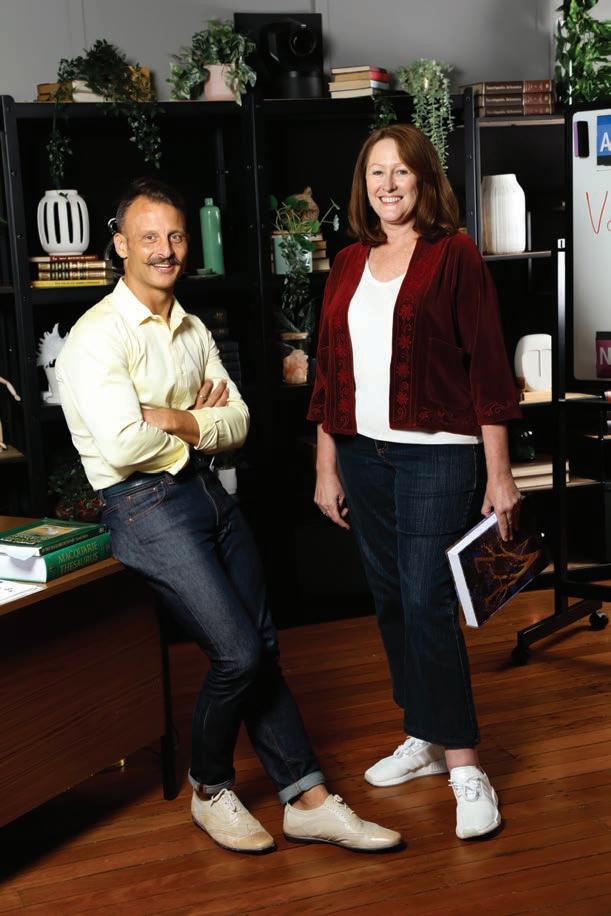

learning disabilities they always go into the good days. They don’t talk about the bad days which is fine and I don’t want to have a pity party, and it’s not me trying to find validation, but I would like to have heard it’s ok if you’re having a bad dyslexic day because it's just that one day or one moment. You either can come back to it later or ask for help and that’s ok. It’s not something you should be ashamed of and it’s ok to have bad dyslexic moments.
That is great advice! How is your fantasy novel coming along and can you let our readers know what it’s about or will they just have to wait and see?
I’ve been working on it since I was 15 and I still am but I’m not worrying so much. I don’t get stuck on repeating ‘I can’t spell this word’, I say to myself ‘ok, I can’t spell this word, leave it, go and write something you can do and then come back to it’ and that’s something I definitely learned from Joe. The story, just to have a brief overview, there is a magical world, it has been cursed, and the main character and her friend are trying to find a cure for her and the people who have been cursed.
Did you learn any other techniques that you’d like to share with our readers?
Yes. If you read with a ruler underneath your page or a bookmark underneath the line that you’re reading, it stops your brain from jumping around the page and you can focus on that one line. Also, try reading with a book in one hand and having a fidget spinner in the other. I don’t know why but that focuses my brain more and it doesn’t let my brain drift.
Also, if you’re working on a computer, iPad
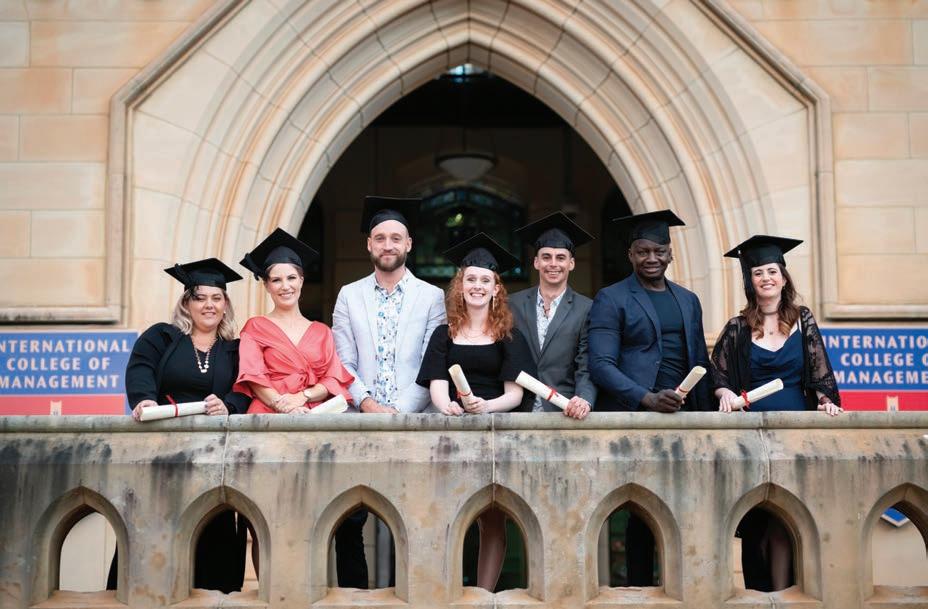
Also, try reading with or Kindle, try changing from a white screen a book in one hand with black writing to the opposite. and having a fidget I have white writing on a black background spinner in the and my work computer and Outlook are other. I don't know basically grayscale, where everything is grey why but that with white writing and it just makes such a focuses my brain more and it doesn’t let my brain dri . difference. Lastly, is there anything else you’d like to add? Just a freestyle question :) I hope everyone enjoys the show and that it might give people and teachers a moment’s pause... If they have someone who is struggling with reading or doing a task, maybe there’s more to it than just being obtuse or something, there might be a reason behind a student struggling in class. Yes I’m pretty sure it’s going to be an eye opener for everyone that watches it, it certainly was for me and I’m really glad that all of you participated and shared your stories! Thanks for speaking with me today and all the best with your journey Shelle.
Thank you so much for speaking with me today Sarah.
You’re welcome!






